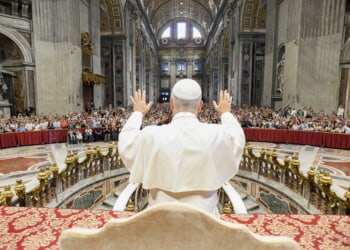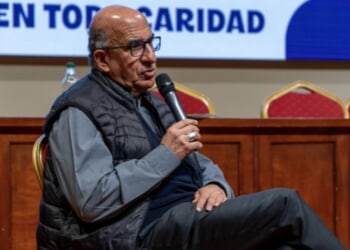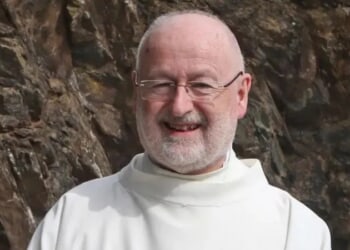Washington, D.C. Newsroom, Aug 14, 2025 /
06:00 am
A recent study has found an increase in the number of Americans Catholics leaving the Church. To combat the issue, the study’s authors suggest creating stronger community ties among Catholics, especially among children.
Michael Rota, philosophy professor at the University of St. Thomas, and Stephen Bullivant, theology and sociology professor at St. Mary’s University, conducted the study examining the decline in religious practice among Catholic-born Americans using data from the General Social Survey (GSS).
The GSS has asked a large representative sample of Americans a number of questions about religion for the past 50 years, which Rota and Bullivant analyzed to write “Religious Transmission: A Solution to the Church’s Biggest Problem,” published by Notre Dame’s Church Life Journal.
The data revealed that in 1973, 84% of the participants raised Catholic still identified as Catholic when surveyed as adults, but in 2002 it was 74%. By 2022, it had dropped to 62%.
In 1973, about 34% of participants raised Catholic were attending Mass weekly (or more often) when they were adults. By 2002, the number had fallen to 20%, and in 2022 it had fallen to 11%.
The study reported the Church is losing 9 out of 10 cradle Catholics, and most are becoming religiously unaffiliated.
Overall, there has been a decline in the number of Americans who prioritize faith. In 2013, 72% of Americans considered religion to be the most important thing in their lives, or among many important things, but in 2023, only 53% said the same.
These declines are due to “weaker social connections among Catholics, the ‘values gap’ between Catholic morality and mainstream American morality, and the internet and smartphones,” Rota told “EWTN News Nightly” in an Aug. 13 interview.
“Before the 1950s, the average Catholic youth would have looked around in their social circle and seen a lot of consensus about faith [and] about the importance of worshipping God in some religion or denomination,” Rota said. “Today, it’s not like that.”
Young Catholics are “much more likely to have many non-Catholic friends, probably non-Catholic family members. In the culture at large, there’s many anti-Catholic and anti-religious voices. So that puts pressure on youth as they grow up.”
Rota explained “the values gap” is a problem because “in the 1930s Catholic morality and mainstream American morality were very close. Now, on issues relating to sexuality, marriage, life issues, they’re quite opposed.”
The last issue the researchers looked at is the changes the internet has caused. Rota said: “When the internet hit the scene, in the late ’90s, we [saw] a huge spike in the percentage of youth who don’t identify with any religion.”
“Human beings are socialized by their families, their close social network, but also by the culture that they’re in. And what the internet and smartphones have done is change the balance of what’s doing more work.”
Americans, especially children, need more Catholic community. It has become harder to find community since “today … our neighbors are more heterogeneous in terms of religion,” but “parents need to intentionally seek out close relationships with other Catholics and put their children in situations where they make friendships with other Catholics.”
There also needs to be “more religious activity,” Rota said. “Just going to Sunday Mass and leaving … doesn’t work anymore for handing on the faith to our children, because the wider culture will no longer guide them back to faith. Rather, it’s more likely to take them away.”
(Story continues below)
Subscribe to our daily newsletter
To help “cradle Catholic youth retain their Catholic identity as they grow into adulthood,” Rota suggested that both parents share the same religion and that parents and children are religiously active. He said it is important for children to see that faith makes a difference in everyday life and that kids have both faith-supportive peers and adult mentors who are not their parents.
Parents should find “a vibrant parish or a Catholic lane movement, where they can walk the life of discipleship in fellowship,” he said.

















